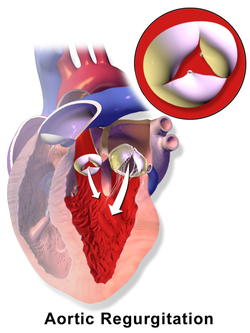Aortic regurgitation
Editor-In-Chief: Prab R Tumpati, MD
Obesity, Sleep & Internal medicine
Founder, WikiMD Wellnesspedia &
W8MD medical weight loss NYC and sleep center NYC
| Aortic regurgitation | |
|---|---|

| |
| Synonyms | Aortic insufficiency |
| Pronounce | N/A |
| Specialty | N/A |
| Symptoms | Shortness of breath, fatigue, palpitations, chest pain |
| Complications | Heart failure, endocarditis, arrhythmias |
| Onset | Gradual |
| Duration | Long-term |
| Types | N/A |
| Causes | Rheumatic fever, endocarditis, bicuspid aortic valve, Marfan syndrome, aortic dissection |
| Risks | Hypertension, connective tissue disorders |
| Diagnosis | Echocardiography, chest X-ray, MRI |
| Differential diagnosis | Mitral regurgitation, ventricular septal defect |
| Prevention | N/A |
| Treatment | Medications, surgery |
| Medication | ACE inhibitors, beta blockers, diuretics |
| Prognosis | Variable, depends on severity and treatment |
| Frequency | Common in older adults |
| Deaths | N/A |
A condition where the aortic valve in the heart does not close tightly
Aortic regurgitation (AR), also known as aortic insufficiency, is a condition in which the aortic valve in the heart does not close tightly, allowing some of the blood that was pumped out of the heart's left ventricle to leak back into it. This can lead to a variety of symptoms and complications if left untreated.
Pathophysiology
Aortic regurgitation occurs when the aortic valve leaflets fail to close completely during diastole, the phase of the heart cycle when the heart relaxes and fills with blood. This incompetence of the valve allows blood to flow backward from the aorta into the left ventricle. Over time, this can lead to volume overload of the left ventricle, causing it to dilate and eventually leading to heart failure.
Causes
Aortic regurgitation can be caused by a variety of conditions, including:
- Rheumatic fever
- Infective endocarditis
- Aortic dissection
- Marfan syndrome
- Bicuspid aortic valve
- Hypertension
- Degenerative changes in the aortic valve
Symptoms
Patients with aortic regurgitation may experience a range of symptoms, including:
- Dyspnea (shortness of breath)
- Fatigue
- Palpitations
- Angina (chest pain)
- Syncope (fainting)
Diagnosis
The diagnosis of aortic regurgitation is typically made using a combination of physical examination, echocardiography, and other imaging techniques. A characteristic finding on auscultation is a diastolic murmur heard best along the left sternal border.
Treatment
Treatment for aortic regurgitation depends on the severity of the condition and the presence of symptoms. Options include:
- Medical management with vasodilators and diuretics
- Surgical intervention, such as aortic valve replacement
Prognosis
The prognosis for patients with aortic regurgitation varies depending on the severity of the condition and the timeliness of treatment. Early intervention can improve outcomes significantly.
Related pages
Transform your life with W8MD's budget GLP-1 injections from $125.
W8MD offers a medical weight loss program to lose weight in Philadelphia. Our physician-supervised medical weight loss provides:
- Most insurances accepted or discounted self-pay rates. We will obtain insurance prior authorizations if needed.
- Generic GLP1 weight loss injections from $125 for the starting dose.
- Also offer prescription weight loss medications including Phentermine, Qsymia, Diethylpropion, Contrave etc.
NYC weight loss doctor appointments
Start your NYC weight loss journey today at our NYC medical weight loss and Philadelphia medical weight loss clinics.
- Call 718-946-5500 to lose weight in NYC or for medical weight loss in Philadelphia 215-676-2334.
- Tags:NYC medical weight loss, Philadelphia lose weight Zepbound NYC, Budget GLP1 weight loss injections, Wegovy Philadelphia, Wegovy NYC, Philadelphia medical weight loss, Brookly weight loss and Wegovy NYC
|
WikiMD's Wellness Encyclopedia |
| Let Food Be Thy Medicine Medicine Thy Food - Hippocrates |
Medical Disclaimer: WikiMD is not a substitute for professional medical advice. The information on WikiMD is provided as an information resource only, may be incorrect, outdated or misleading, and is not to be used or relied on for any diagnostic or treatment purposes. Please consult your health care provider before making any healthcare decisions or for guidance about a specific medical condition. WikiMD expressly disclaims responsibility, and shall have no liability, for any damages, loss, injury, or liability whatsoever suffered as a result of your reliance on the information contained in this site. By visiting this site you agree to the foregoing terms and conditions, which may from time to time be changed or supplemented by WikiMD. If you do not agree to the foregoing terms and conditions, you should not enter or use this site. See full disclaimer.
Credits:Most images are courtesy of Wikimedia commons, and templates, categories Wikipedia, licensed under CC BY SA or similar.
Translate this page: - East Asian
中文,
日本,
한국어,
South Asian
हिन्दी,
தமிழ்,
తెలుగు,
Urdu,
ಕನ್ನಡ,
Southeast Asian
Indonesian,
Vietnamese,
Thai,
မြန်မာဘာသာ,
বাংলা
European
español,
Deutsch,
français,
Greek,
português do Brasil,
polski,
română,
русский,
Nederlands,
norsk,
svenska,
suomi,
Italian
Middle Eastern & African
عربى,
Turkish,
Persian,
Hebrew,
Afrikaans,
isiZulu,
Kiswahili,
Other
Bulgarian,
Hungarian,
Czech,
Swedish,
മലയാളം,
मराठी,
ਪੰਜਾਬੀ,
ગુજરાતી,
Portuguese,
Ukrainian
Contributors: Prab R. Tumpati, MD



